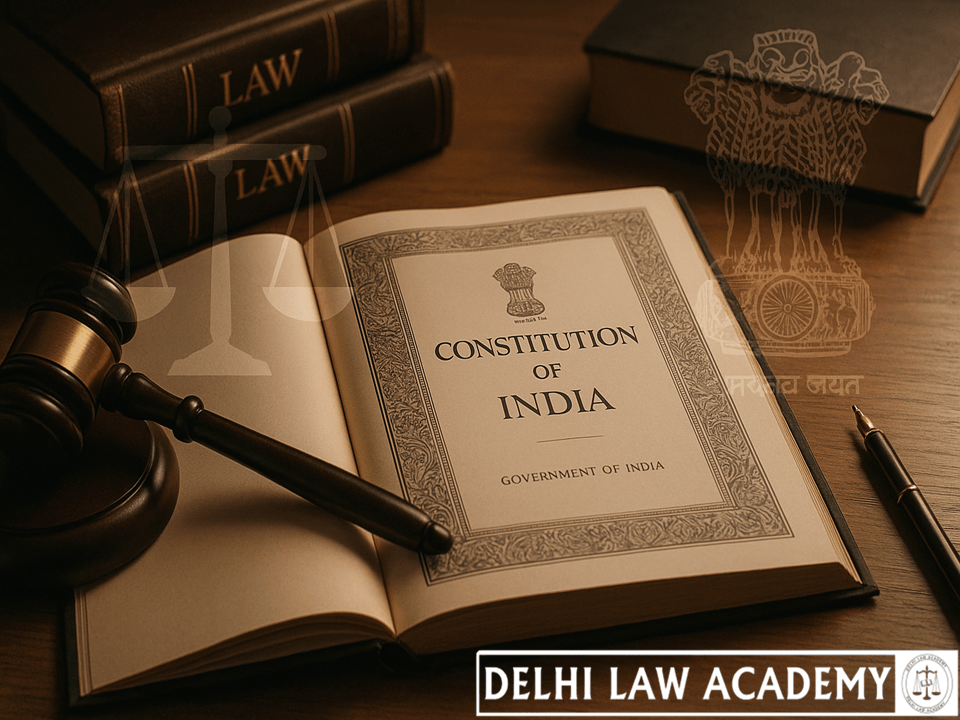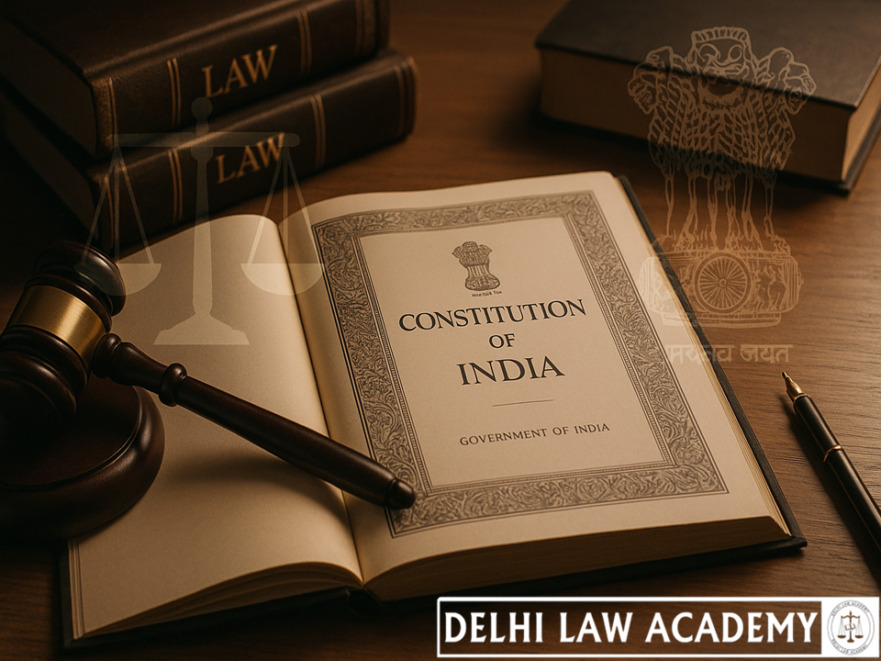
⚖️ Shalini Shyam Shetty v. Rajendra Shankar Patil (SC 2010) – Articles 226 & 227
Delhi Law Academy Jaipur presents below for aspirants of RJS, DJS, PCS (J) and other Judicial Services throughout India a summarized version of the Supreme Court judgment in the case of Shalini Shyam Shetty v. Rajendra Shankar Patil answering the question whether a writ can be issued u/a 226 to a private entity/person and if yes, in what cases.
📚 Case Details & Topics
Article 226 and 227
TOPIC:
• Difference and distinction between article 226 and article 227
• Scope of jurisdiction under article 226
Supreme Court:
• A private person becomes amenable to writ jurisdiction only if he is connected with a statutory authority or only if he/she discharges any official duty.
• High Court can issue writ to any person, but the person against whom writ will be issued must have some statutory or public duty to perform.
📝 Judgment (Verbatim)
2. This appeal has been filed by the original defendant challenging the judgment and order dated 09.02.2009 of the Bombay High Court rendered in the Writ Petition filed under Article 226 of the Constitution of India.
3. The facts of the case are that the respondent/plaintiff filed a suit for eviction on the grounds of breach of terms of tenancy, damage to the property as well as causing nuisance and annoyance to the plaintiff and the other occupants.
15. The facts of the case have been discussed in detail in order to show that in a pure dispute of landlord and tenant between private parties, a writ petition was entertained by the High Court.
17. This Court is unable to appreciate this submission. First of all this Court finds that the petition which was filed before the High Court was a pure and simple writ petition. It was labeled as Writ Petition No.7926 of 2008.
32. No writ petition can be moved under Article 227 of the Constitution nor can a writ be issued under Article 227 of the Constitution. Therefore, a petition filed under Article 227 of the Constitution cannot be called a writ petition.
60. Another distinction between these two jurisdictions is that under Article 226, High Court normally annuls or quashes an order or proceeding but in exercise of its jurisdiction under Article 227, the High Court, apart from annulling the proceeding, can also substitute the impugned order by the order which the inferior tribunal should have made.
61. Jurisdiction under Article 226 normally is exercised where a party is affected but power under Article 227 can be exercised by the High Court suo motu as a custodian of justice. In fact, the power under Article 226 is exercised in favour of persons or citizens for vindication of their fundamental rights or other statutory rights. Jurisdiction under Article 227 is exercised by the High Court for vindication of its position as the highest judicial authority in the State. In certain cases where there is infringement of fundamental right, the relief under Article 226 of the Constitution can be claimed ex-debito justicia or as a matter of right. But in cases where the High Court exercises its jurisdiction under Article 227, such exercise is entirely discretionary and no person can claim it as a matter of right. From an order of a Single Judge passed under Article 226, a Letters Patent Appeal or an intra Court Appeal is maintainable. But no such appeal is maintainable from an order passed by a Single Judge of a High Court in exercise of power under Article 227.
64. It is well settled that a writ petition is a remedy in public law which may be filed by any person but the main respondent should be either Government, Governmental agencies or a State or instrumentalities of a State within the meaning of Article 12. Private individuals cannot be equated with State or instrumentalities of the State. All the respondents in a writ petition cannot be private parties. But private parties acting in collusion with State can be respondents in a writ petition. Under the phraseology of Article 226, High Court can issue writ to any person, but the person against whom writ will be issued must have some statutory or public duty to perform.
65. Reference in this connection may be made to the Constitution Bench decision of this Court in the case of Sohan Lal vs. Union of India and another, reported in AIR 1957 SC 529.
66. The facts in Sohan Lal are that Jagan Nath, a refugee from Pakistan, filed a writ petition in the High Court of Punjab against Union of India and Sohan Lal alleging unauthorized eviction from his residence and praying for a direction for restoration of possession. The High Court directed Sohan Lal to restore possession to Jagan Nath. Challenging that order, Sohan Lal approached this Court. The Constitution Bench of this Court accepted the appeal and overturned the verdict of the High Court.
67. In paragraph 7, page 532 of the judgment, the unanimous Constitution Bench speaking though Justice Imam, laid down a few salutary principles which are worth remembering and are set out:
“7. The eviction of Jagan Nath was in contravention of the express provisions of Section 3 of the Public Premises (Eviction) Act. His eviction, therefore, was illegal. He was entitled to be evicted in due course of law and a writ of mandamus could issue to or an order in the nature of mandamus could be made against the Union of India to restore possession of the property to Jagan Nath from which he had been evicted if the property was still in the possession of the Union of India. The property in dispute, however, is in possession of the appellant. There is no evidence and no finding of the High Court that the appellant was in collusion with the Union of India or that he had knowledge that the eviction of Jagan Nath was illegal. Normally, a writ of mandamus does not issue to or an order in the nature of mandamus is not made against a private individual. Such an order is made against a person directing him to do some particular thing, specified in the order, which appertains to his office and is in the nature of a public duty (Halsbury’s Laws of England Vol. 11, Lord Simonds Edition. 84). If it had been proved that the Union of India and the appellant had colluded, and the transaction between them was merely colourable, entered into with a view to deprive Jagan Nath of his rights, jurisdiction to issue a writ to or make an order in the nature of mandamus against the appellant might be said to exist in a Court…”
70. It is only a writ of Habeas Corpus which can be directed not only against the State but also against private person.
72. Therefore, a private person becomes amenable to writ jurisdiction only if he is connected with a statutory authority or only if he/she discharges any official duty.
73. In the instant case none of the above features are present, even then a writ petition was filed in a pure dispute between landlord and tenant and where the only respondent is the plaintiff landlord. Therefore, High Court erred by entertaining the writ petition. However, the petition was dismissed on merits by a rather cryptic order.
74. It has repeatedly been held by this Court that a proceeding under Article 226 of the Constitution is not the appropriate forum for adjudication of property disputes or disputes relating to title.
76. this Court in M/s. Hindustan Steel Limited, Rourkela vs. Smt. Kalyani Banerjee and others [(1973) 1 SCC 273] held that serious questions about title and possession of land cannot be dealt with by writ court.
79. We would like to make it clear that in view of the law referred to above in cases of property rights and in disputes between private individuals writ court should not interfere unless there is any infraction of statute or it can be shown, that a private individual is acting in collusion with a statutory authority.
83. For the reasons aforesaid, it is held that the High Court committed an error in entertaining the writ petition in a dispute between landlord and tenant and where the only respondent is a private landlord.
***************
📘 Stay Ahead with Delhi Law Academy!
Get access to free monthly current affairs, read our insightful blogs,
and explore free study resources prepared by experts at DLA Jaipur. 🚀
❓ Frequently Asked Questions on Articles 226 & 227 (Shalini Shyam Shetty Case)
⚖️ What is the main difference between Article 226 and Article 227?
Article 226 empowers the High Court to issue writs for the enforcement of fundamental rights and other legal rights.
Article 227, on the other hand, confers supervisory jurisdiction over all courts and tribunals.
Under Article 226, orders are normally quashed; under Article 227, the HC can also substitute the order that the lower court *should* have passed.
🏛️ Can a writ be issued against a private person under Article 226?
Yes, but only in limited situations.
A private individual becomes amenable to Article 226 only if:
• they discharge a public/statutory duty, or
• they act in collusion with a statutory authority.
Otherwise, writ jurisdiction does not apply to disputes between private persons.
📜 Why did the Supreme Court say a landlord–tenant dispute cannot be handled under Article 226?
The Court held that pure private disputes—such as landlord–tenant matters—cannot be adjudicated under Article 226 unless there is violation of a statute or collusion with a government authority.
Property and title disputes must be addressed through civil courts, not writ jurisdiction.
🔍 Is Article 227 a writ jurisdiction?
No.
The Supreme Court clarified that no writ can be issued under Article 227.
A petition under Article 227 is *not* a writ petition; it is purely supervisory jurisdiction exercised by the High Court as the custodian of justice.
⚠️ Can a person demand relief as a right under Article 227?
No.
Article 227 relief is entirely discretionary.
While Article 226 may offer relief as a matter of right in cases of fundamental rights violations, Article 227 allows the High Court to intervene on its own (suo motu) to ensure justice and proper functioning of subordinate courts.
📚 What principles did the Supreme Court reaffirm in the Shalini Shyam Shetty case?
The Court reiterated that:
• Writs are primarily for public law remedies.
• Private individuals cannot be respondents unless linked with statutory authority.
• Article 227 petitions are supervisory, not writ-based.
• High Courts must not entertain writs in purely civil or property disputes.
• Only habeas corpus can lie against private persons as of right.
Contact us
📍 Delhi Law Academy – Jaipur Branch
6C, Tower 2, Coaching Hub, Pratap Nagar, Jaipur – 302033
📞 Phone:
+91 9911916552
+91 8447285606
✉️ Email:
contactus@delhilawacademy.com

